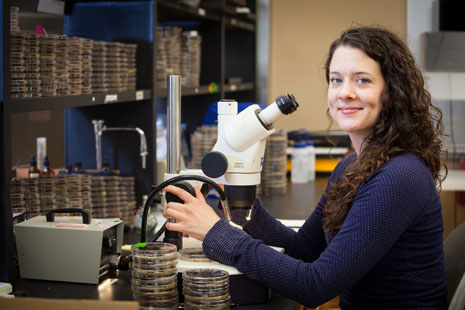
FAYETTEVILLE, Ark. — Laura Walker, a doctoral candidate in biological sciences, has received a doctoral dissertation improvement grant from the National Science Foundation.
Walker’s dissertation involves the study of a group of slime molds known as myxomycetes. Over the past two summers she has conducted research in collaboration with the Smithsonian Tropical Research Institute.
These grants provide partial support of doctoral dissertation research for improvement beyond the already existing project, including participation in scientific meetings, conducting research in specialized facilities or field settings, or expanding an existing body of dissertation research.
The $18,900 grant will allow Walker to finish a long-term nutrient fertilization experiment she is conducting in Panama.
“My goal is to make more clear the possible nutrient limitations and foundational concepts that control the patterns and dynamics of myxomycete diversity in the litter and soil microhabitats,” Walker said. “I collected all of my samples last summer while working on a Smithsonian Pre-Doctoral Fellowship. Work with the forest litter samples is almost complete, but I needed the NSF funding to carry out environmental sequencing of soil samples.”
In 2012, Walker became the first scientist to collect slime molds from soils in Panama’s Barro Colorado Nature Monument. In doing so, she became one of the first researchers to systematically take samples of slime molds, the most abundant predators of soil bacteria and fungi, in tropical soils.
The Republic of Panama also benefits greatly from this research, Walker said. Two species completely new to science have been discovered in the context of this project and at least 24 new species of myxomycetes have been recorded for Panama, with more likely to follow.
“Soil myxomycetes appear to be an important and integral part of the soil microbial community but very little is actually known about this group, especially in the tropics,” Walker said. “One major reason is because of the difficulty in isolating and culturing this soil myxomycete group for study, hence the need for a DNA sequencing approach. These data will provide the very first in-depth look into the soil myxomycete community and help to increase our understanding of myxomycete ecology, and soil microbial ecology as a whole.”
Walker will conduct all of the work on the U of A campus with the assistance of biological sciences and food science faculty. Several undergraduates have been working with her throughout the course of the project, as well.
Topics
Contacts
Chris Branam, research communications writer/editor
University Relations
479-575-4737,